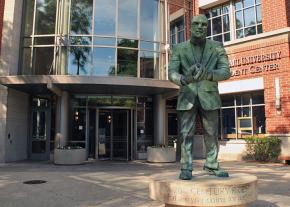DePaul’s night guards need a living wage
reports from Chicago on what's at stake in a struggle for campus guards.
NIGHT GUARDS at Chicago's DePaul University are planning a one-day unfair labor practices strike on October 24, and students, faculty and other members of the DePaul community will gather at the Lincoln Park campus to show their support.
The strike and solidarity protests are aimed at pressuring the administration to switch to a union subcontractor for the night guards--while retaining all the current employees--to ensure that they receive a living wage and benefits.
As anyone familiar with DePaul will attest, the school likes to pride itself on its commitment to "Vincentian values," which include an obligation to serve the poor and disadvantaged. Outside of the student center, at the base of a statue of Father Egan, an alumni of DePaul who marched with Martin Luther King Jr. and organized with Saul Alinsky, there is an inscription which reads: "What are you doing for justice?"
But if you were to ask the night guards at DePaul what their employer is doing for justice, they'd paint a very different picture of the university.

DePaul subcontracts its night security staff through the notoriously anti-labor Guardian Security Services Inc. For working nights and making sure students are safe at the dorms and elsewhere on campus--often as the first source of first aid for students--the guards get a $12 an hour wage, no access to affordable health care and no union representation. Many struggle to afford basic necessities like groceries and public transit fares.
Importantly, the night guards aren't the same as the campus' security officers, who are often off-duty or retired Chicago police. The night guards are low-wage and mostly Black workers. A fight for better conditions for them at a university that prides itself on its social justice reputation is part of a broader fight for racial and economic justice for Chicago's Black working class.
Confronted by students concerned about these conditions, a DePaul administrator had only one solution to offer if the school were to pay a living wage: a tuition hike.
This is one of the most odious aspects of the neoliberalization of higher education: the way costs are pushed onto an obscenely indebted student body, despite the big salaries and endowments to be found at any major university.
DePaul is no exception: its endowment is worth $420 million, and it recently spent $82 million on a new basketball arena. The suggestion that the school is incapable of affording a different security subcontractor without resorting to a tuition hike is absurd.
The only way the security officers will get the rights they deserve is through protest and struggle. It is up to us to show DePaul and the guards that the old labor movement slogan "an injury to one is an injury to all" still applies today.


